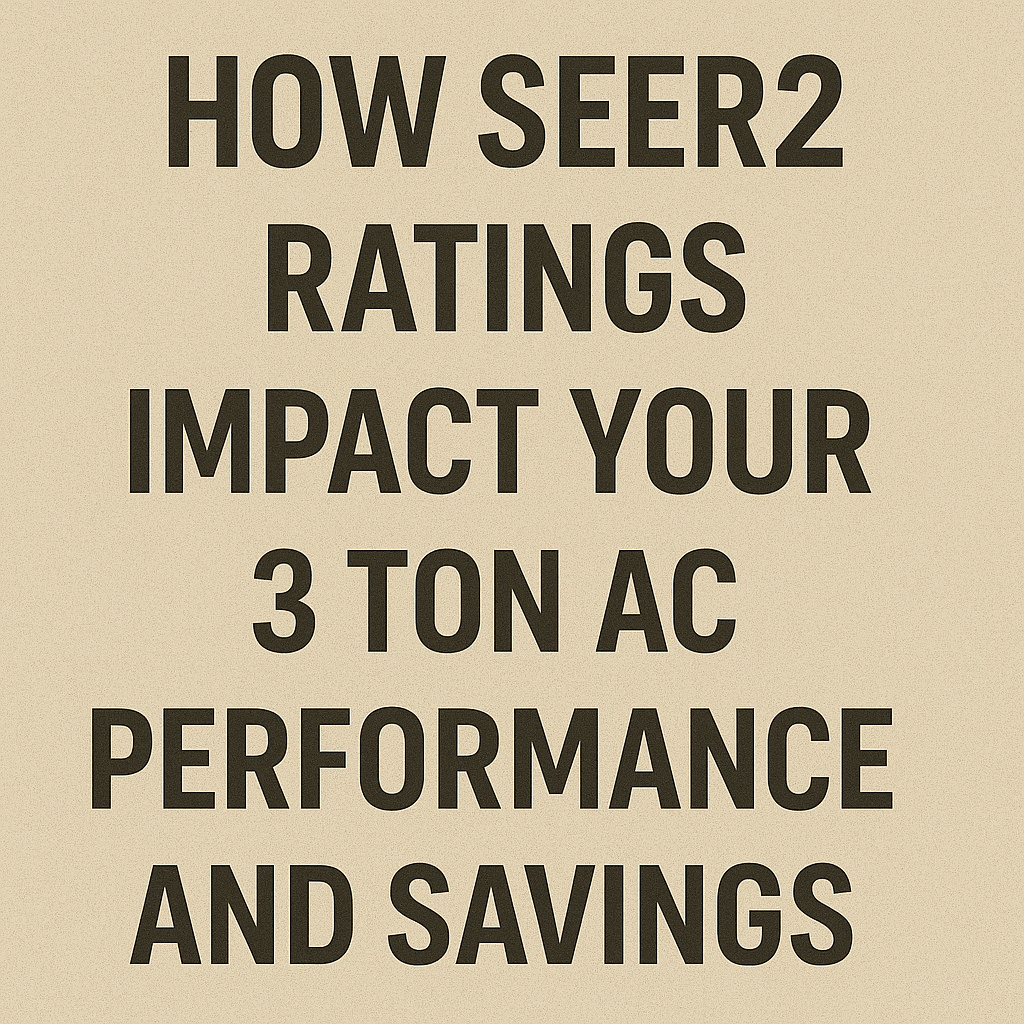When shopping for a 3-ton air conditioner, one of the most important metrics you’ll encounter is the SEER2 rating. While it might seem like just another technical spec, SEER2 plays a major role in determining how much energy your system uses—and how much money it can save you over time.
This guide breaks down what SEER2 really means, how it compares to the previous SEER system, and why choosing a high-SEER2 3-ton unit can maximize comfort, performance, and cost-efficiency in your home.
What Is SEER2?
SEER2 stands for Seasonal Energy Efficiency Ratio 2, a 2023 update to the original SEER standard. It measures how efficiently an air conditioning system performs over an average cooling season, taking into account realistic system operation conditions and external static pressure.
The formula is similar to miles-per-gallon for a car—the higher the SEER2, the more efficient the unit. A 3-ton AC with a 17 SEER2 rating will use less electricity than a 14 SEER2 unit to produce the same cooling output.
Learn more from the U.S. Department of Energy’s SEER2 guidelines.
SEER vs. SEER2: What’s the Difference?
SEER2 was introduced to reflect more accurate field conditions than its predecessor:
| Aspect | SEER | SEER2 |
|---|---|---|
| Test Pressure | 0.1 in. WC static pressure | 0.5 in. WC static pressure |
| Realism | Lab-like, ideal conditions | Closer to real-world use |
| Regulatory Year | Pre-2023 | Required as of Jan 2023 |
| Minimum for AC | 13–14 | 14.3 (equivalent) |
Due to these changes, SEER2 values are slightly lower numerically than SEER for equivalent performance. A SEER 16 model would now test at about SEER2 15.2.
Minimum SEER2 Standards by Region
As of January 1, 2023, the DOE mandates minimum SEER2 levels by U.S. region:
-
North: 13.4 SEER2
-
Southeast: 14.3 SEER2
-
Southwest: 14.3 SEER2 (plus EER2 requirement)
Use the Energy.gov regional HVAC standards map to determine your specific requirements.
How SEER2 Affects Monthly Utility Bills
Higher SEER2 = lower energy consumption. Consider this comparison for a 3-ton unit:
| SEER2 Rating | Estimated Annual Cooling Cost* |
|---|---|
| 13.4 | $1,050 |
| 14.3 | $980 |
| 16 | $870 |
| 18 | $780 |
(*Based on 2,000 cooling hours/year @ $0.13/kWh)
Over a 10-year span, the cost difference between a 13.4 and 18 SEER2 unit could exceed $2,500.
High-SEER2 Units Often Qualify for Incentives
Many local and federal programs offer rebates or tax credits for SEER2-compliant AC units:
-
Federal 25C Tax Credit: Up to $600 for SEER2-qualified units
-
Utility Company Rebates: Use DSIRE to search by ZIP code
-
Manufacturer Rebates: Check Carrier, Trane, Lennox seasonal promotions
These incentives help reduce the upfront cost of high-efficiency models.
Comfort Benefits Beyond Efficiency
High-SEER2 systems often include features that enhance comfort and air quality:
-
Variable-speed compressors for more precise cooling
-
Advanced humidity control
-
Quieter operation
-
Smart thermostat integration
These features deliver consistent temperatures, reduce wear on parts, and improve indoor air quality—particularly valuable in high-humidity regions.
SEER2 Considerations for 3 Ton AC Systems
In a 3-ton configuration, SEER2 matters even more because of the larger energy draw. Choosing a 16+ SEER2 system can make a noticeable impact on:
-
Monthly operating costs
-
Payback period for premium equipment
-
Total environmental impact (carbon footprint)
For comparison shopping, visit the AHRI Directory and search by SEER2 rating, brand, and capacity.
Choosing the Right SEER2 Level for Your Home
Factors to consider when selecting a SEER2 rating:
-
Your climate: Hotter regions benefit more from higher SEER2
-
Your usage: Frequent AC users save more with efficient models
-
Budget: Higher SEER2 units cost more upfront but pay off long term
Discuss your needs with a contractor who can perform a Manual J load calculation and assess system sizing.
Conclusion: Make SEER2 Work for You
SEER2 ratings provide a more accurate look at your AC unit’s real-world efficiency. Investing in a high-SEER2 3-ton air conditioner not only reduces your utility bills, but also increases comfort and may qualify you for valuable incentives.
Explore our selection of 3 Ton SEER2-Compliant AC Units, or contact us for help choosing the right SEER2 level for your region, budget, and home layout.







